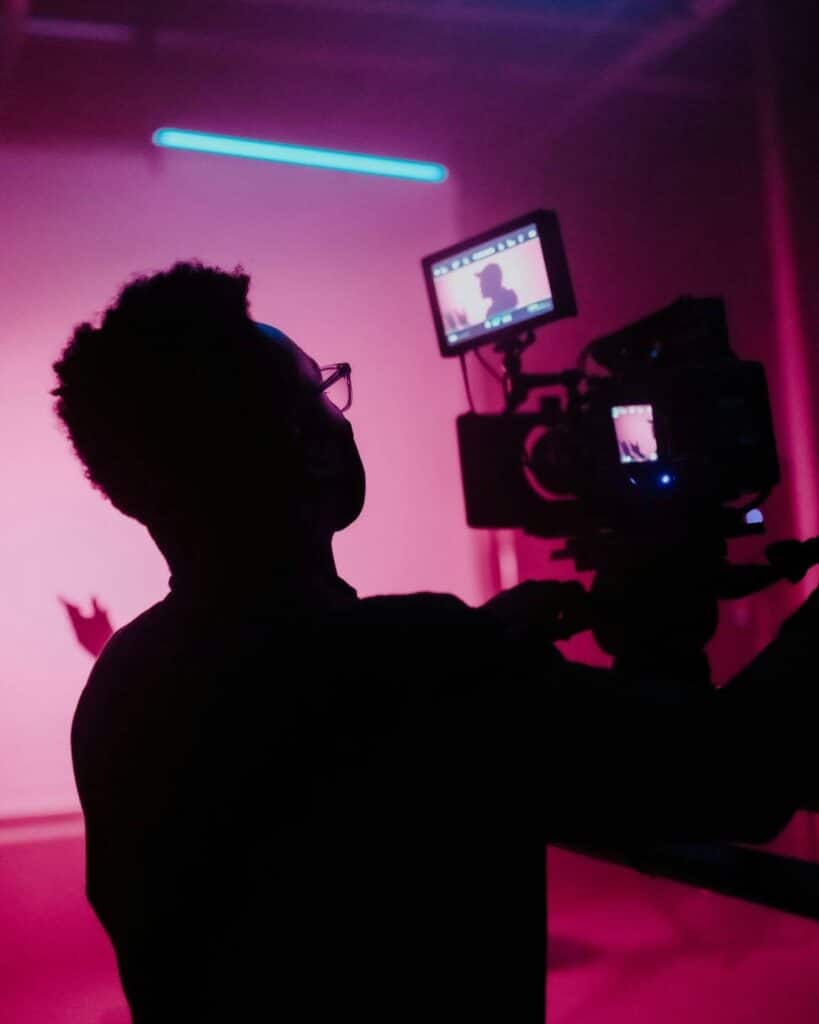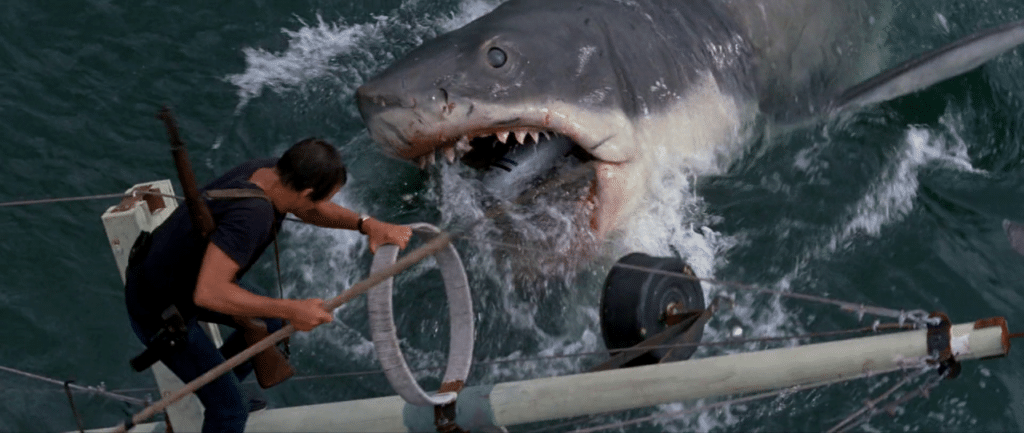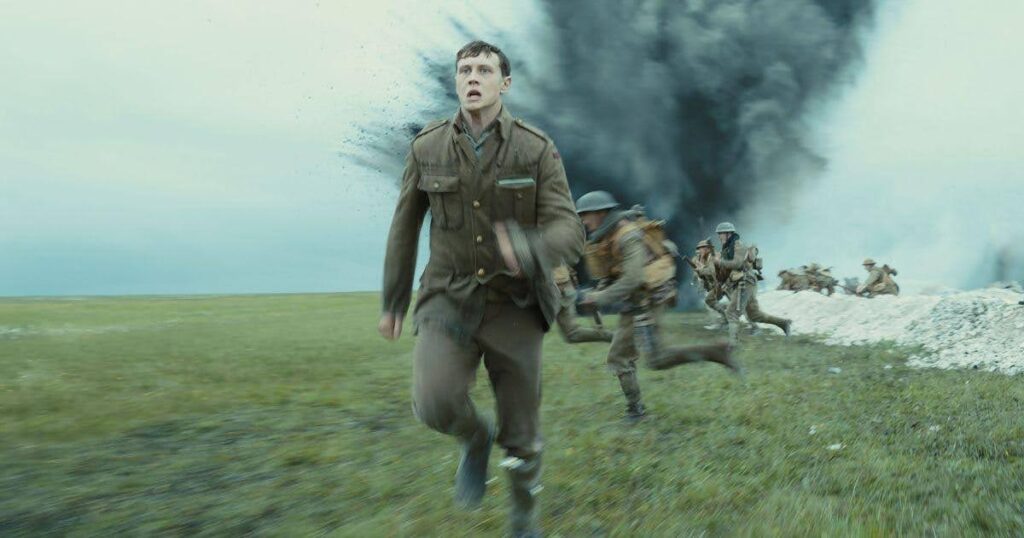
Introduction
The film industry is a huge web of creativity, technical skills, and most of all, teamwork. When most of us think of film production, we tend to focus on the writers, directors and actors who tend to be the faces of the industry.
However, as you’ll know by the credits at the end of a movie, there is a vast network of professionals all contributing their expertise to bring the overall vision of a movie to life.
There isn’t just one way to break into film with many paths to explore beyond the conventional routes of writing and directing. Of course, if this is your goal, then, keep pursuing it. However, if you are looking for something a little more outside the box, then you’re in the right place!
In today’s article, we’ll introduce you to the diverse roles within the film industry and show how you can break into the field yourself. So, let’s get started!
A Film Industry Overview
The process of making a movie has it’s very own three acts (see what we did there?) – pre-production, production, and post-production. After that, everything is handed over to marketing and distribution.
While we often hear about the glamorous roles that make headlines such as actors and directors, but without the unsung heroes behind the scenes, there wouldn’t be movies at all!
These professionals work across many different departments, ensuring that productions run smoothly, stay on schedule, and deliver a quality product for audiences. Duties can be anything from organizing sets, coordinating logistics, designing costumes, and editing footage to managing finances and developing story ideas.
Let’s take a look at some of these roles and how they contribute to the workings of a movie.

Production Assistants (PAs)
Production assistants are often the first entry point for many industry professionals. Even though the role is often considered entry-level it is an invaluable experience for anyone aspiring to work in film.
PAs perform a wide variety of tasks, from handling on set logistics to assisting with paperwork and ensuring everything runs smoothly on set. These positions, while gruelling at times, allow newcomers to observe professionals and learn how a film set operates firsthand.
Script Supervisors
The script supervisor plays a crucial role in maintaining continuity throughout the production process. They ensure the actors follow the script correctly and that any changes in dialogue, timing, or blocking are documented for consistency.
Without them, a film would be riddled with continuity errors like mismatched props or inconsistent dialogue.
Cinematographers (DOPs)
Cinematographers or Directors of Photography (DOPs), focus on the visual storytelling of a movie. They’re responsible for the look and feel of a film, advising on how each shot is framed, angled, lit, and captured.
They collaborate closely with the director to ensure the visual style matches the tone and atmosphere of the story to enhance the overall look.
Sound Designers and Editors
Sound design is another critical aspect of filmmaking but is often overlooked. Sound designers create the auditory experience for the film by recording sound effects, manipulating audio and designing the soundscapes that immerse the audience.
Sound editors then ensure all audio elements are balances, from dialogue to music and effects, to create a seamless sound environment. If these roles didn’t exist, it could pave the way for huge sound discrepancies with music drowning out dialogue or sound levels being completely askew!

Jobs That Can Help You Break into Film
There’s no denying that breaking into the film industry can be a challenge, but there are many entry-level positions that offer hands-on experience and a chance to learn about the industry. These roles are also ideal for networking and building up your contacts as a newcomer.
Here are just some of the roles that can help you pave the way to a successful film career.
Development Assistant
This is a great creative role working in the initial stages of a film’s creation. Development assistants help production companies acquire scripts, research potential projects and scout for new talent. Internally, they are also key in organizing meetings, reviewing materials and assisting with the preparation of scripts for the production phase.
If you’re someone who wants to get involved in the business side of filmmaking or dreams of becoming a producer, than this role could just be the one you’re looking for.
Storyboard Artist
These guys are responsible for translating the director’s vision into visual images, outlining the shots, angles, and action for each scene. Storyboard artists play a vital pre-production role that provides a visual roadmap for the crew, helping everyone involved understand the director’s intended direction for the movie.
If you have the knack for drawing and love visualizing concepts through art, then storyboard artist could be a great starting point for you.

Script Reader
Not to be confused with a Development Assistant, Script Readers (also known as Script Analysts) focus on reviewing submitted screenplays and providing feedback based on their potential for success.
Script Readers work for production companies, assessing whether scripts align with the company’s goals. They find strong elements of the story and offer suggestions for improvement.
Readers are also pivotal in the running of film festivals with screenplay categories as well as script coverage services. If you’re an aspiring writer with a passion for storytelling and a key eye for detail, this is an excellent entry-level job for you.
Assistant Editor
In the post-production process, assistant editors help manage footage, organize media, and help the lead editor in cutting and assembling the final product. They ensure that all footage is properly logged, catalogued and prepared for editing.
If you’re keen to learn more about the technical side of filmmaking and have a passion for editing, then you may have just found your calling!
No matter how small a role may seem, it has a significant part to play in making a movie a reality. For example, a script reader may find the next big Hollywood blockbuster idea, while a development assistant could the person between a project progressing from concept to pre-production.
Storyboard artists translate abstract ideas into concrete visuals, giving everyone on set a clear vision on what is to be created. The assistant editor helps stitch together the raw footage into the spectacles we know and love on the silver screen.
All these roles, along with all in the film industry are highly skilled, with specialist expertise. When combined, they create a seamless production process that just wouldn’t be possible without them.
Try Celtx today and make your mark behind the scenes
You’ll find that many of your favorite film professionals all started in entry-level positions such as these, gaining experience and contacts along the way that eventually helped them land significant roles in larger projects.Take renowned director Steven Spielberg. He begun his time as an ‘unofficial apprentice’ at Universal Studios, where he tried to experiment with advanced camera techniques. His risk didn’t pay off but his perseverance and constant drive to try new things, he eventually found himself directing Jaws in 1975. And the rest is history.

Or take Seth MacFarlane, now best known for his comedy genius and shows such as Family Guy and American Dad!, who started out as an animator for Hanna-Barbera’s Cartoon Network classics Johnny Bravo, Cow and Chicken and Dexter’s Laboratory.
He also branched out into movies, creating and starring in Ted, Ted 2 and A Million Ways to Die in the West.Now an actor, musician and writer as well as many other strings to his bow, MacFarlane is now one of the most recognized faces in modern television.

Networking and Gaining Experience
So, here it is. You knew you wouldn’t get through this article without us mentioning networking. But it’s one of the most important tools for anyone looking into the film industry.
Yes, talent and hard work are essential, however, building relationships with industry professionals can offer invaluable opportunities. Internships, workshops, and networking events are excellent ways to meet people and get your foot in the door.
There are countless networking opportunities out there – you just need to know where to look.
Networking
Film festivals, industry events, and online communities are great places to network with fellow filmmakers. By building relationships with other industry professionals, you can pave the way for future collaborations, job opportunities and mentorship.
The key is to be a good human, and don’t always go into a conversation with an agenda to sell your screenplay or promote your skills. Simply chatting about your favorite movies or your long-term goals can be enough. It’s all about building authentic connections and staying up to date with industry trends and developments.
Internships and Workshops
Internships are an excellent way to gain firsthand experience and learn about the ins and outs of filmmaking. Many film companies, production studios and agencies offer internships which allow you to work alongside experienced professionals.
Workshops and training programs also provide practical skills and knowledge about specific areas of filmmaking, such as screenwriting, editing, or cinematography.
To find out our top recommendations for screenwriting internships, check out our dedicated article here.
Success Stories
We’ve already heard about the success of director extraordinaire Steven Spielberg and Seth MacFarlane, but what about those creatives who have forged amazing careers in a different field?
Take Roger Deakins, the master cinematographer behind Blade Runner and 1917, who started off his career as a camera assistant, working on documentaries in Africa before moving onto more musical projects. It wasn’t until the 1980s, that Deakins found success in features and his unique palette found notoriety.
Deakins is now one of the most celebrated cinematographers in film history.

Sound mixer Kevin O’Connell’s start in the industry was anything but smooth. Starting as a projectionist at 20th Century Fox, he later failed the trade union examination to keep his job and served as a firefighter. Returning to the industry a year later, he became a machine-room operator at Warner Hollywood Studios, working on Grease before earning his first screen credit as a recording technician on Star Wars: The Empire Strikes Back. Since then, O’Connell has worked on Spider-Man and Transformers, winning his first Academy Award for Hacksaw Ridge in 2016.

How Celtx Can Support Your Career in Film
No matter the path you wish to take, Celtx is here to support you on your journey into the film industry. Our comprehensive suite of pre-production tools can help with scriptwriting, storyboarding, budgeting and scheduling, streamlining the entire process.
With our script breakdown tool, we help you separate all the components that make up your script, from categorizing characters, props and locations to scheduling and organizing the production process, Celtx does it all!
We also allow you and your peers to collaborate, enabling you to work together in real time, sharing notes and feedback so you can concentrate on creating.
Check out how we can help you here.
Resources for Finding Opportunities in Film
It’s great to know all these opportunities are out there, but where should you go to actually find them?
There are several websites and organizations that cater specifically to aspiring filmmakers looking to advance their careers. Check out sites like Mandy, ProductionHub and Staff Me Up, who are always listing job opportunities for various roles within the industry.
We also highly recommend joining professional organizations such as the Writers Guild of America or the Producers Guild of America who share guidance and everything you need to know about the business side of working in the industry.
For networking opportunities, the Film Society at the Lincoln Center can also give you access to exclusive events and workshops!
Conclusion
The film industry offers countless opportunities beyond writing and directing. By exploring diverse roles, gaining experience, and networking, there’s no reason why you can’t carve your own path to success.
With tools like Celtx and the right resources, your journey in film begins now.
Interested in a job in film? You might like these articles:
- How to Become a Producer in Film and TV
- How to Become a Script Reader: 7-Step Guide
- How to Become a Screenwriter: A Guide for Aspiring Writers
